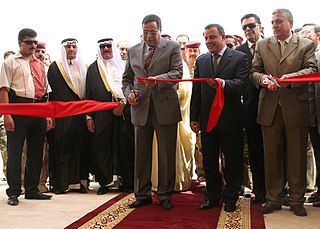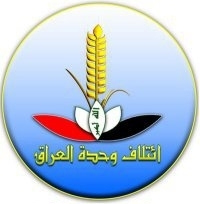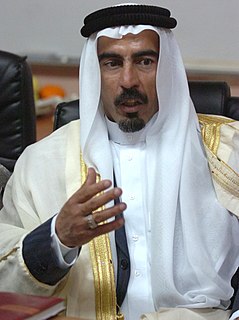
Al Anbar Governorate, or Anbar Province, is the largest governorate in Iraq by area. Encompassing much of the country's western territory, it shares borders with Syria, Jordan, and Saudi Arabia. The provincial capital is Ramadi; other important cities include Fallujah and Haditha.
The Sons of Iraq were coalitions between tribal Sheikhs in the Al Anbar province in Iraq as well as former Saddam Hussein's Iraqi military officers that united to maintain stability in their communities. They were initially sponsored by the US military.

Tanzim Qaidat al-Jihad fi Bilad al-Rafidayn or TQJBR, also referred to as Al-Qaeda in Iraq, AQI, or Al-Qaeda in Mesopotamia) was an Iraqi Sunni Islamic Jihadist organization affiliated with al-Qaeda, for part of the first two decades of the 21st century.

Governorate or provincial elections were held in Iraq on 31 January 2009, to replace the local councils in fourteen of the eighteen governorates of Iraq that were elected in the 2005 Iraqi governorate elections. 14,431 candidates, including 3,912 women, contested 440 seats. The candidates came from over 400 parties, 75% of which were newly formed.

A parliamentary election was held in Iraq on 7 March 2010. The election decided the 325 members of the Council of Representatives of Iraq who would elect the Iraqi prime minister and president. The election resulted in a partial victory for the Iraqi National Movement, led by former Interim Prime Minister Ayad Allawi, which won a total of 91 seats, making it the largest alliance in the Council. The State of Law Coalition, led by incumbent Prime Minister Nouri Al-Maliki, was the second largest grouping with 89 seats.
The National Front for the Salvation of Iraq is a political party in Iraq. It developed out of the Awakening movements and is mostly made up of Sunni Muslim tribal leaders from Al-Anbar province, an ethnic Arab region.
The Tribes of Iraq Coalition also known as the Anbar Salvation Council is an Iraqi political coalition formed to contest the Al Anbar governorate election, 2009 which won 2 out of 29 seats. The party was one of several formed out of the Awakening movements - Sunni tribal militias armed and financed by the United States Army to fight al-Qaeda in Iraq. The coalition was led by Sheikh Hamid al-Hais. In an interview with the Washington Post prior to the election, Hais said he would kill all the Iraqi Islamic Party's candidates if anything happened to any of his candidates.

Qasim Mohammad Abid Hammadi al-Fahadawi is an Iraqi politician and businessman who is the current Minister of Electricity in the Al Abadi Government, and who previously served as the Governor of Anbar from April 2009 to August 2013.
The Intellectuals and Tribes Alliance for Development or Coalition of Intellectuals and Tribes was an Iraqi political list which stood in the Al Anbar governorate election, 2009. The list was created by the then ruling Iraqi Islamic Party because their popularity had severely decreased. They formed an alliance together with the Coalition of Intellectuals and Tribes together with uniting the Islamic Party, the gathering of Anbar’s Tribal Leaders and Intellectuals, Iraq’s People’s Conference and the Independent Tribal National Gathering. The list won 15.9% of the vote and 6 out of 29 seats.

The Unity Alliance of Iraq commonly known as Iraq's Unity, Iraqi Unity or Wassat is an Iraqi political coalition formed to contest the Iraqi parliamentary election, 2010. The coalition was formed by Sheikh Ahmed Abu Risha, the head of the Awakening movement, a Sunni tribal militia which was successful in significantly reducing the insurgency in al-Anbar Governorate and was then reformed into a political party, the Iraq Awakening and Independents National Alliance, which won the most seats in the Al Anbar governorate election, 2009. The Awakening Alliance joined forces with Iraq's Shi'a interior minister Jawad al-Bolani and his secular Iraqi Constitutional Party and Ahmed Abdul Ghafour al-Samarrai, chief of Sunni Endowment Office. The list is led by Jawad al-Bolani.

Operation al-Shabah was launched in May 2013 by the Iraqi Army, with the stated aim of severing contact between the Islamic State of Iraq and the Levant and the al-Nusra Front in Syria by clearing militants from the border area with Syria and Jordan.
The Al Anbar governorate election of 2013 was held on 20 June 2013 alongside elections for Ninevah.

The Islamic State of Iraq was a militant Salafist jihadist group that aimed to establish an Islamic state in Sunni, Arab-majority areas of Iraq during the Iraq War and later in Syria during the Syrian Civil War.

The Uniters for Reform Coalition is a Sunni political coalition in Iraq.

Ali Hatem Abd al-Razzaq Ali al-Suleiman al-Assafi al-Dulaimi is a Sunni sheikh in Anbar province. He is the former Emir of the Dulaim tribe, a position now held by his brother, Abdulrazzaq Hatem Abd al-Razzaq Ali al-Suleiman al-Assafi al-Dulaimi.

The Al-Karmah offensive (2015), named Fajr al-Karma, was an offensive launched by the Iraqi Army and anti-ISIL Sunni tribal fighters to recapture the Al-Karmah district taken by the Islamic State of Iraq and the Levant in Iraq. The offensive began on 14 April 2015. During the offensive the anti-ISIL forces captured part of the city of Al-Karmah, and the old road of Al-Karmah.












